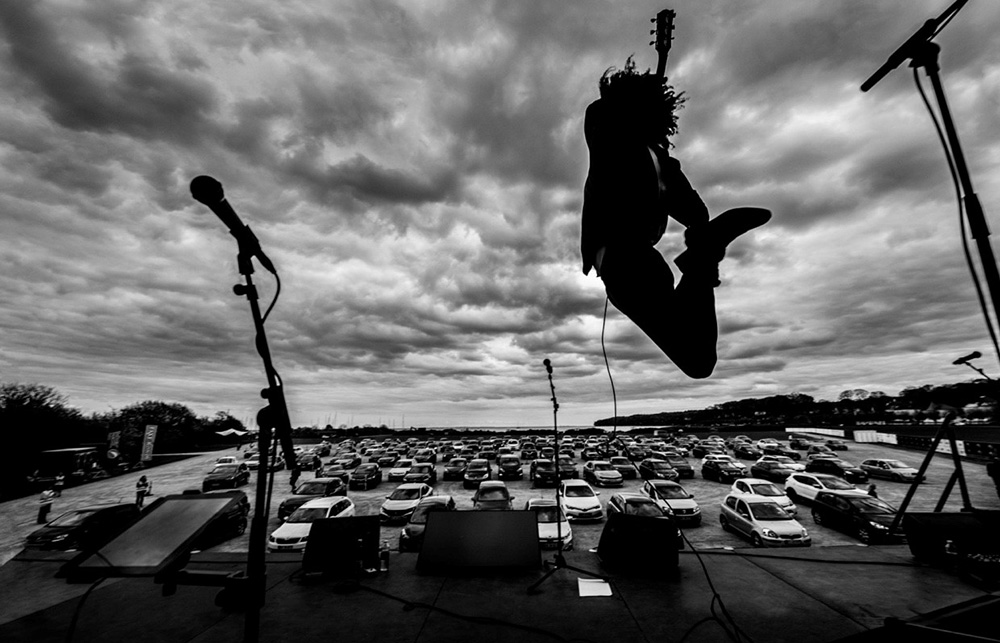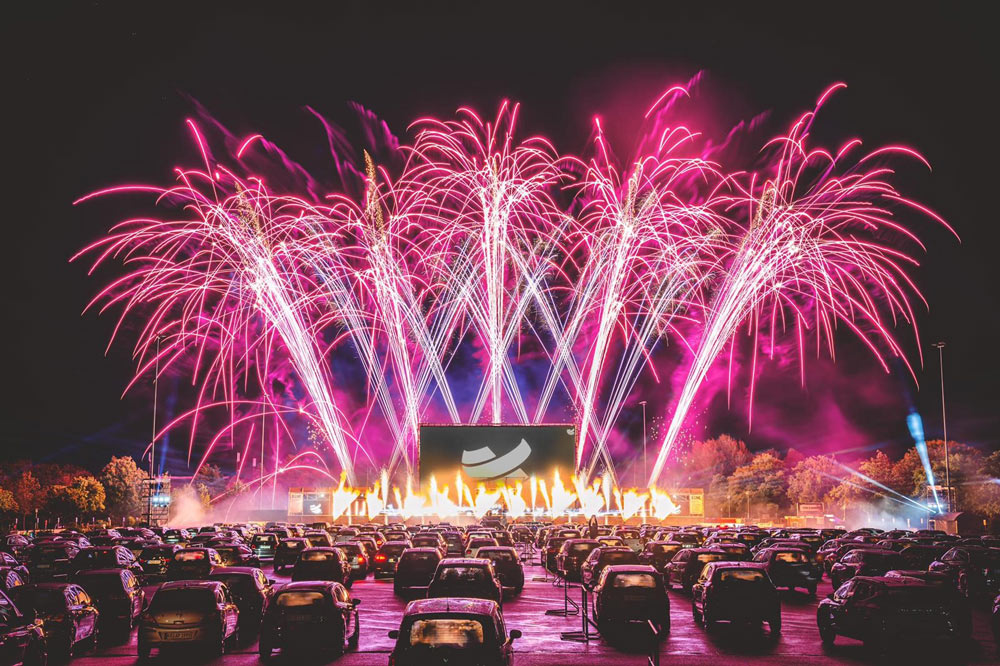
今年3月初,,丹麥政府為貫徹封城政策宣布禁止舉行音樂會,,這讓身為音樂家和音樂會主辦者的馬克·開姆尼茨顯得有些不知所措。于是他便與友人集思廣益,,想出了一個新的,,但其實早已風行多年的主意。
“我們只能另尋出路,?!?開姆尼茨說,“未來五,、六個月,,甚至更長時間,我們都不能出去演出,。我們對彼此說,,我們左右不了疫情,但總不能因為有新冠疫情,,就讓文化消亡吧,。除了對演出形式進行創(chuàng)新,我們別無他法,?!?/font>
在對已有百年歷史的“汽車影院”概念進行重新包裝后,他們打造出了現(xiàn)代化,、連續(xù)舉辦的“P scenen”文化節(jié),。
在奧胡斯市議會的協(xié)助下,他們獲準在Tangkrogen公園內搭建大型舞臺,。放在過去,,如此規(guī)模的舞臺前會擠滿上萬名觀眾。而在疫情期間,,觀眾則只能坐在數(shù)百輛整齊停放的汽車中,,透過擋風玻璃和車載FM廣播欣賞藝術家的現(xiàn)場表演。
當然,,沒車也沒有關系,梅賽德斯與汽車租賃巨頭Europcar提供了嶄新的汽車供觀眾使用,,對于同樣身處困境的汽車行業(yè)而言,,這種活動無疑是極佳的營銷機會。
首場音樂會于4月24日舉行,,丹麥著名歌手,、詞作者麥茲·蘭格通過Zoom視頻會議接受了觀眾的演出邀請并在此次音樂會中登臺獻藝。此后,,幾乎每天都會有音樂會,、獨角喜劇、戲劇演出、電影放映和教堂禮拜在內的各種活動,。
現(xiàn)在不只是丹麥,,德國也有多家活動承辦公司開始舉辦車上狂歡晚會,。而這一切的實現(xiàn)則離不開商業(yè)模式理念的巨大轉變,。但還是要再說一次,現(xiàn)場音樂行業(yè)現(xiàn)在看起來并沒有太多選擇余地,。
“營收下跌之快令人眼暈”
根據(jù)歐洲現(xiàn)場音樂協(xié)會提供的數(shù)據(jù),,該行業(yè)去年在歐洲全境的總收入超過了84億美元。而現(xiàn)在,,協(xié)會的主席文森佐·斯佩拉稱,,這一數(shù)字很可能會出現(xiàn)約80%的下滑。
他說:“受新冠疫情影響,,2月以來,,歐洲已有多家音樂公司的營業(yè)額出現(xiàn)大幅下滑,速度之快令人眼暈,。由于這些公司仍然需要向供應商,、雇員、稅務機關和銀行支付必要款項,,這種局面正在耗盡他們手中的流動性,。”
斯佩拉還表示,,封城期間,,現(xiàn)場娛樂行業(yè)損失慘重,因為每個人都被告知現(xiàn)在不要進行社交,,而 “社交”恰恰是該行業(yè)存在的基礎,。由于現(xiàn)場音樂行業(yè)的復雜性“常常不為人知”,他呼吁歐洲各國政府對現(xiàn)場音樂行業(yè)的需求給予更多關注,。
當被問及對車上音樂會這種活動有什么看法時,,斯佩拉說:“這種活動作為權宜之計當然是可行的,但還是取代不了傳統(tǒng)音樂會的位置,?!彼€表示,突然走紅的“線上音樂會”也是個辦法,,但同樣解決不了根本問題,。”
“我們看到世界各地的藝術家嘗試了許多非常棒的方法,,但現(xiàn)場活動的震撼之處以及所創(chuàng)造身心體驗是這些舉措所無法達到的,?!彼古謇f,“有些舉措還存在經濟和可持續(xù)性方面的復雜問題,?!?/font>
但現(xiàn)場音樂的創(chuàng)新者們并非不清楚這些問題的存在。
新的模式
開姆尼茨的Front of House公司和P scenen 的其他組織者(視聽公司Steady和Nordic Rentals)顯然需要重新思考現(xiàn)場音樂會的經濟性,。
相對于可以容納成千上萬名觀眾的傳統(tǒng)音樂節(jié),,他們在 Tangkrogen 的場地僅能停放五、六百輛汽車,。然而,,活動主辦方沒有為了彌補門票收入而提升票價。他們按車而不是按人收費,,還會建議觀眾僅攜自己社交圈之內的親朋好友一同觀看,,票價高低則取決于藝術家的知名度。如此一來,,門票價格按人計算后通常比以前還便宜,。
這種情況的出現(xiàn)很大程度上是音樂節(jié)連續(xù)舉辦的結果。開姆尼茨在很多年前就有了這種想法,,只不過這次是迫于無奈才實施這一方案,。這種做法有效降低了音樂節(jié)的制作成本。
“這種經濟模式適合于那種持續(xù)舉行的活動,,而非一次性活動,。”開姆尼茨說, “挺有意思的,,等疫情結束之后我們打算把這種模式應用到其他活動中去,。效果真的不錯?!?/font>
此外,,這種音樂節(jié)還構建了一種各方合作的架構,讓藝術家,、活動主辦方和承辦方都能參與其中,。開姆尼茨認為,這種架構可以確保各方在工作中投入更多努力,。他表示,,如果藝術家能設法賣掉自己音樂會的門票,那么他們的收入將與疫情前相當,。
德國電子舞曲巨頭BigCityBeats的首席執(zhí)行官伯恩德·布萊特對于通過車上音樂會賺錢持有不同看法,。
BigCityBeats主辦的World Club Dome音樂節(jié)原計劃于今年6月在在法蘭克福舉行,,但因新冠疫情而被迫取消,,按照德國政府的規(guī)定,,8月前不得舉行任何大型音樂會。該音樂節(jié)原本可以在三天的時間里吸引到約18萬名觀眾到場,。

首屆World Club Dome車上狂歡晚會于5月1日在杜塞爾多夫舉行,雖然現(xiàn)場僅停入500輛汽車,,每輛車上最多兩人,,但活動主辦方在制作上依然是全情投入,將其打造成了一場融合煙火,、激光表演的盛大演出,。
布萊特表示:“這種音樂會最多只能容納1000名觀眾,而粉絲又不可能愿意花200到400歐元(相當于217到434美元)來買一張票,,所以就更難操作了,。最后我們決定將每張票的票價定為40歐元,同時引入一些贊助商來幫我們分擔額外成本,,從而降低總支出,。如果舉辦方式得宜,這種活動就能在帶給粉絲巨大樂趣的同時提升知名度,,還可以在這個特殊時期為民眾創(chuàng)造一種非常棒的體驗……我們沒打算賺錢,,也沒想過要創(chuàng)造一種新的商業(yè)模式?!?/font>
Breiter hopes clubbers will repay the favor by coming to BigCityBeats' more traditional festivals from next January. 布萊特希望觀眾明年能來BigCityBeats更為傳統(tǒng)的現(xiàn)場音樂節(jié)捧場,,通過親臨現(xiàn)場來回饋公司今年奉上的精彩演出。
全新體驗
顯然,,對觀眾而言,,車上音樂會不是他們習以為常的事物,但也確實為創(chuàng)新提供了新的途徑,。
以World Club Dome車上狂歡晚會為例,,DJ便在表演中添加了汽車鳴笛和車燈閃爍的元素。坐在車中的現(xiàn)場觀眾可以通過與表演者同步操作來獲得互動體驗,。
"Judging by the WorldClubbers' reactions, they absolutely loved it," says Breiter. “從到場觀眾的反應來看,,他們顯然很喜歡這種感覺?!辈既R特說,。
在奧胡斯舉辦的P scenen音樂節(jié)的體驗雖然與之頗為不同,但同樣讓人拍手叫絕,。因為演出聲音信號直接通過老式無線電傳輸?shù)浆F(xiàn)場觀眾的汽車之中,,所以演出現(xiàn)場顯得非常安靜。
開姆尼茨表示,,通過采用這種方式,,他們得以在不影響周邊居民的情況下舉辦大型演出,。新的模式也帶來了全新的聲音效果。由于無需擔心環(huán)境噪聲或相位效應的影響,,所以無論觀眾坐在哪里,,都不會出現(xiàn)聲音質量下降的問題。而且由于沒有巨型音響系統(tǒng),,不會產生話筒回音問題,,所以可以使用更靈敏的高級電容式麥克風。
“我們可以將其布置得跟工作室一樣……所有的聲音都會非常清晰,?!遍_姆尼茨說。
當然,,需要保持社交疏離的不僅是觀眾,,在舞臺上表演的演職人員也是如此。而規(guī)模較大的樂團要想做到這一點也得有點創(chuàng)意才行,。
“我們在周日舉辦了一場有合唱團參加的福音教堂禮拜活動,。” 開姆尼茨說,,“因為臺上只允許站10個人,,所以我們就把合唱團安排在了舞臺前的車上。我們安排攝像師繞著汽車拍攝,,然后再把視頻畫面投放到屏幕上,。為了方便牧師、合唱團與民眾互動,,我們還用上了Zoom,。”
開姆尼茨還提到,,有個12歲的小朋友因為在家憋久了,,出現(xiàn)了非常嚴重的焦慮癥狀,而兒童音樂會是他在封城之后首次能在一個安全的環(huán)境中加入狂歡人群,,當時他貼著父親汽車的擋風玻璃流出了開心的淚水,。
他說:“這種活動為全新人群帶來了全新的體驗?!保ㄘ敻恢形木W(wǎng))
譯者:Feb
今年3月初,,丹麥政府為貫徹封城政策宣布禁止舉行音樂會,這讓身為音樂家和音樂會主辦者的馬克·開姆尼茨顯得有些不知所措,。于是他便與友人集思廣益,,想出了一個新的,但其實早已風行多年的主意。
“我們只能另尋出路,?!?開姆尼茨說,“未來五,、六個月,甚至更長時間,,我們都不能出去演出,。我們對彼此說,我們左右不了疫情,,但總不能因為有新冠疫情,,就讓文化消亡吧。除了對演出形式進行創(chuàng)新,,我們別無他法,。”
在對已有百年歷史的“汽車影院”概念進行重新包裝后,,他們打造出了現(xiàn)代化,、連續(xù)舉辦的“P scenen”文化節(jié)。
在奧胡斯市議會的協(xié)助下,,他們獲準在Tangkrogen公園內搭建大型舞臺,。放在過去,如此規(guī)模的舞臺前會擠滿上萬名觀眾,。而在疫情期間,,觀眾則只能坐在數(shù)百輛整齊停放的汽車中,透過擋風玻璃和車載FM廣播欣賞藝術家的現(xiàn)場表演,。
當然,,沒車也沒有關系,梅賽德斯與汽車租賃巨頭Europcar提供了嶄新的汽車供觀眾使用,,對于同樣身處困境的汽車行業(yè)而言,,這種活動無疑是極佳的營銷機會。
首場音樂會于4月24日舉行,,丹麥著名歌手,、詞作者麥茲·蘭格通過Zoom視頻會議接受了觀眾的演出邀請并在此次音樂會中登臺獻藝。此后,,幾乎每天都會有音樂會,、獨角喜劇、戲劇演出,、電影放映和教堂禮拜在內的各種活動,。
現(xiàn)在不只是丹麥,德國也有多家活動承辦公司開始舉辦車上狂歡晚會,。而這一切的實現(xiàn)則離不開商業(yè)模式理念的巨大轉變,。但還是要再說一次,,現(xiàn)場音樂行業(yè)現(xiàn)在看起來并沒有太多選擇余地。
“營收下跌之快令人眼暈”
根據(jù)歐洲現(xiàn)場音樂協(xié)會提供的數(shù)據(jù),,該行業(yè)去年在歐洲全境的總收入超過了84億美元,。而現(xiàn)在,協(xié)會的主席文森佐·斯佩拉稱,,這一數(shù)字很可能會出現(xiàn)約80%的下滑,。
他說:“受新冠疫情影響,2月以來,,歐洲已有多家音樂公司的營業(yè)額出現(xiàn)大幅下滑,,速度之快令人眼暈。由于這些公司仍然需要向供應商,、雇員,、稅務機關和銀行支付必要款項,這種局面正在耗盡他們手中的流動性,?!?/font>
斯佩拉還表示,封城期間,,現(xiàn)場娛樂行業(yè)損失慘重,,因為每個人都被告知現(xiàn)在不要進行社交,而 “社交”恰恰是該行業(yè)存在的基礎,。由于現(xiàn)場音樂行業(yè)的復雜性“常常不為人知”,,他呼吁歐洲各國政府對現(xiàn)場音樂行業(yè)的需求給予更多關注。
當被問及對車上音樂會這種活動有什么看法時,,斯佩拉說:“這種活動作為權宜之計當然是可行的,,但還是取代不了傳統(tǒng)音樂會的位置?!彼€表示,,突然走紅的“線上音樂會”也是個辦法,但同樣解決不了根本問題,?!?/font>
“我們看到世界各地的藝術家嘗試了許多非常棒的方法,但現(xiàn)場活動的震撼之處以及所創(chuàng)造身心體驗是這些舉措所無法達到的,?!彼古謇f,“有些舉措還存在經濟和可持續(xù)性方面的復雜問題,?!?/font>
但現(xiàn)場音樂的創(chuàng)新者們并非不清楚這些問題的存在。
新的模式
開姆尼茨的Front of House公司和P scenen 的其他組織者(視聽公司Steady和Nordic Rentals)顯然需要重新思考現(xiàn)場音樂會的經濟性。
相對于可以容納成千上萬名觀眾的傳統(tǒng)音樂節(jié),,他們在 Tangkrogen 的場地僅能停放五,、六百輛汽車。然而,,活動主辦方沒有為了彌補門票收入而提升票價,。他們按車而不是按人收費,還會建議觀眾僅攜自己社交圈之內的親朋好友一同觀看,,票價高低則取決于藝術家的知名度,。如此一來,門票價格按人計算后通常比以前還便宜,。
這種情況的出現(xiàn)很大程度上是音樂節(jié)連續(xù)舉辦的結果。開姆尼茨在很多年前就有了這種想法,,只不過這次是迫于無奈才實施這一方案,。這種做法有效降低了音樂節(jié)的制作成本。
“這種經濟模式適合于那種持續(xù)舉行的活動,,而非一次性活動,。”開姆尼茨說, “挺有意思的,,等疫情結束之后我們打算把這種模式應用到其他活動中去,。效果真的不錯?!?/font>
此外,,這種音樂節(jié)還構建了一種各方合作的架構,讓藝術家,、活動主辦方和承辦方都能參與其中,。開姆尼茨認為,這種架構可以確保各方在工作中投入更多努力,。他表示,,如果藝術家能設法賣掉自己音樂會的門票,那么他們的收入將與疫情前相當,。
德國電子舞曲巨頭BigCityBeats的首席執(zhí)行官伯恩德·布萊特對于通過車上音樂會賺錢持有不同看法,。
BigCityBeats主辦的World Club Dome音樂節(jié)原計劃于今年6月在在法蘭克福舉行,但因新冠疫情而被迫取消,,按照德國政府的規(guī)定,,8月前不得舉行任何大型音樂會。該音樂節(jié)原本可以在三天的時間里吸引到約18萬名觀眾到場,。
首屆World Club Dome車上狂歡晚會于5月1日在杜塞爾多夫舉行,,雖然現(xiàn)場僅停入500輛汽車,每輛車上最多兩人,但活動主辦方在制作上依然是全情投入,,將其打造成了一場融合煙火,、激光表演的盛大演出。
布萊特表示:“這種音樂會最多只能容納1000名觀眾,,而粉絲又不可能愿意花200到400歐元(相當于217到434美元)來買一張票,,所以就更難操作了。最后我們決定將每張票的票價定為40歐元,,同時引入一些贊助商來幫我們分擔額外成本,,從而降低總支出。如果舉辦方式得宜,,這種活動就能在帶給粉絲巨大樂趣的同時提升知名度,,還可以在這個特殊時期為民眾創(chuàng)造一種非常棒的體驗……我們沒打算賺錢,也沒想過要創(chuàng)造一種新的商業(yè)模式,?!?/font>
Breiter hopes clubbers will repay the favor by coming to BigCityBeats' more traditional festivals from next January. 布萊特希望觀眾明年能來BigCityBeats更為傳統(tǒng)的現(xiàn)場音樂節(jié)捧場,通過親臨現(xiàn)場來回饋公司今年奉上的精彩演出,。
全新體驗
顯然,,對觀眾而言,車上音樂會不是他們習以為常的事物,,但也確實為創(chuàng)新提供了新的途徑,。
以World Club Dome車上狂歡晚會為例,DJ便在表演中添加了汽車鳴笛和車燈閃爍的元素,。坐在車中的現(xiàn)場觀眾可以通過與表演者同步操作來獲得互動體驗,。
"Judging by the WorldClubbers' reactions, they absolutely loved it," says Breiter. “從到場觀眾的反應來看,他們顯然很喜歡這種感覺,?!辈既R特說。
在奧胡斯舉辦的P scenen音樂節(jié)的體驗雖然與之頗為不同,,但同樣讓人拍手叫絕,。因為演出聲音信號直接通過老式無線電傳輸?shù)浆F(xiàn)場觀眾的汽車之中,所以演出現(xiàn)場顯得非常安靜,。
開姆尼茨表示,,通過采用這種方式,他們得以在不影響周邊居民的情況下舉辦大型演出,。新的模式也帶來了全新的聲音效果,。由于無需擔心環(huán)境噪聲或相位效應的影響,所以無論觀眾坐在哪里,,都不會出現(xiàn)聲音質量下降的問題,。而且由于沒有巨型音響系統(tǒng),,不會產生話筒回音問題,所以可以使用更靈敏的高級電容式麥克風,。
“我們可以將其布置得跟工作室一樣……所有的聲音都會非常清晰,。”開姆尼茨說,。
當然,,需要保持社交疏離的不僅是觀眾,在舞臺上表演的演職人員也是如此,。而規(guī)模較大的樂團要想做到這一點也得有點創(chuàng)意才行,。
“我們在周日舉辦了一場有合唱團參加的福音教堂禮拜活動?!?開姆尼茨說,,“因為臺上只允許站10個人,所以我們就把合唱團安排在了舞臺前的車上,。我們安排攝像師繞著汽車拍攝,,然后再把視頻畫面投放到屏幕上。為了方便牧師,、合唱團與民眾互動,,我們還用上了Zoom,?!?/font>
開姆尼茨還提到,有個12歲的小朋友因為在家憋久了,,出現(xiàn)了非常嚴重的焦慮癥狀,,而兒童音樂會是他在封城之后首次能在一個安全的環(huán)境中加入狂歡人群,當時他貼著父親汽車的擋風玻璃流出了開心的淚水,。
他說:“這種活動為全新人群帶來了全新的體驗,。”(財富中文網(wǎng))
譯者:Feb
When Denmark's government banned concerts as a lockdown measure in early March, musician and event organizer Mark Chemnitz wasn't sure what to do. So he and his friends brainstormed and came up with a new—yet decidedly old-fashioned—idea.
"We had to rethink the whole game," Chemnitz says. "None of us could go out and play any gigs for the next five or six months, maybe longer. We said to each other, just because there's COVID-19, that doesn't mean culture is dead…You can't hold it in. We did it because we had no other choice."
What they did was to repurpose the century-old concept of the drive-in theater as a modern-day, continuous culture festival, called P scenen.
With assistance from the council in the city of Aarhus, they gained permission to set up a large stage in the Tangkrogen public park. Once, such a stage might have had 10,000 people thronging before it. Now, in the age of the coronavirus, the audience would sit encased in hundreds of cars, spaced out in neat rows, with their occupants enjoying the live entertainment through their windscreens and tuned to their FM radios.
For those without vehicles of their own, Mercedes and rental giant Europcar provided new cars for people to sit in—a neat marketing opportunity for an industry that is itself in crisis.
The first concert took place on April 24, featuring the popular Danish singer-songwriter Mads Langer, who took audience requests through a Zoom videoconference. Since then, events have taken place most days, ranging from concerts, stand-up comedy and theater productions to film screenings and church services.
The idea isn't just confined to Denmark; in Germany, multiple club promoters have started holding drive-in raves. This all requires a big shift in thinking around business models. But, again, it's not like the live music industry has much choice right now.
"A dizzying drop"
According to the European Live Music Association, the sector drew in more than $8.4 billion across the continent last year. Now, says association president Vincenzo Spera, that figure will likely drop by around 80%.
"With the COVID-19 crisis, many music companies across Europe have been experiencing a dizzying drop in turnover since February, which is draining liquidity, against [necessary payments to] suppliers, employees, tax authorities and banks," he says.
Spera says the sector is being particularly "penalized" during lockdown because live entertainment is inherently social—which is what we're all being told not to be. He calls for European governments to pay more attention to the live-music industry's needs, as its complexities are "often little known."
And what of ideas such as drive-in concerts? "This is mostly a working hypothesis that certainly cannot replace the typical use of concerts," says Spera, while arguing that the suddenly-popular phenomenon of livestreamed concerts is "also an option, but it cannot be the solution."
"We are seeing many important initiatives by artists from all over the world, but it is difficult to think of replacing the emotional charge and the consequent physical and emotional experience that the live event brings," says Spera. "Then there is the complex issue linked to the economic sustainability of certain proposals."
But neither of these factors is lost on live music's new innovators.
New models
Chemnitz's Front of House company and the other P scenen organizers—audiovisual firms Steady and Nordic Rentals—have certainly had to rethink the economics of live music.
Whereas a regular festival might pull in many thousands of people, they can only get 500-600 cars onto the Tangkrogen field. But the organizers are not charging more per ticket to compensate. They charge per car rather than per person—the recommendation is that people only bring the close friends or family members in their social bubble—with the price varying according to the prominence of the artist. And the result is that it generally works out cheaper for each person to attend, not more expensive.
This is largely because of the continuous nature of the festival—an idea Chemnitz says he had been toying with for years before it was forced into reality. This drives down the capital costs of the production.
"The economic model works over time, but not as a one-off," Chemnitz says. "That is very interesting, because when we get on the other side of this, we will apply this model to other festivals. It works really well."
The festival is also structured as a type of cooperative effort, where artists, organizers and promoters all have a stake. Chemnitz argues that this ensures the participants all work harder. If artists manage to sell out their concerts, he says, they earn much the same as they would have done in former times.
Bernd Breiter, the CEO of German electronic dance music giant BigCityBeats, has a different take on the issue of making money through drive-in concerts.
BigCityBeats' World Club Dome festival was due to take place in Frankfurt in June, before the coronavirus forced its cancellation—Germany's government won't allow any big concerts until August at the earliest. It would have drawn in 180,000 clubbers over three days.
The first World Club Dome Drive-In rave, which took place in Düsseldorf on May 1, could only take in 500 cars, with up to two people in each. Meanwhile, the organizers still went all-in on creating a huge show, involving fireworks and lasers.
"This makes it harder, because we're limited to 1,000 people, and we would never expect our fans to pay €200-€400 [$217-$434] a ticket," says Breiter. "So we made a decision to charge €40 per ticket, and we brought in some sponsors to help with the extra costs. This brought down the totals. However if you host an event like this correctly, you can offer fans huge amounts of fun, raise awareness and provide a great feeling during such a strange time...We weren’t looking to make money, or develop a business model."
New experiences
The drive-in concert experience is obviously not what people are used to, but it does provide new avenues for creativity.
In the case of World Club Dome Drive-In, the DJs added elements such as car horns and flashing indicators to their performances. The crowd, sitting in their cars, synced up to the performers for a communal experience.
Aarhus's P scenen festival experience is quite different, though no less remarkable. There, quietness is the order of the day, due to the use of old-school radio transmissions right into concert-goers' cars.
According to Chemnitz, this makes it possible to put on a big show without bothering residents in nearby properties too much. It also has huge implications for sound production. There's no need to worry about the acoustics of the environment or the phasing effect that can result in people hearing a washy sound, depending on where they are sitting or standing. And because there is none of the microphone feedback that would be associated with a giant sound system, it is possible to use more sensitive, high-grade condenser microphones.
"We could make it into a studio setup… Everything is crystal clear," Chemnitz says.
Of course, it's not just the audience that needs to adhere to social distancing—the same applies to the performers on the stage. For larger ensembles, that requires an extra layer of creativity.
"On Sunday we had a gospel church service with a choir," Chemnitz says. "We can only have 10 people on stage, so we put the choir in cars in front of the stage. We had the camera people going around the cars, filming them and showing them onscreen. And for the preacher and the choir to interact with people, we had the Zoom app."
Chemnitz says that, during a children's concert, one 12-year-old boy was pressed up against the windscreen of his father's car, crying happy tears—he suffered from intense anxiety and was for the first time able to be part of a festival crowd, while in a safe space.
"It's opened up the experience to a whole new segment of people," he says.






